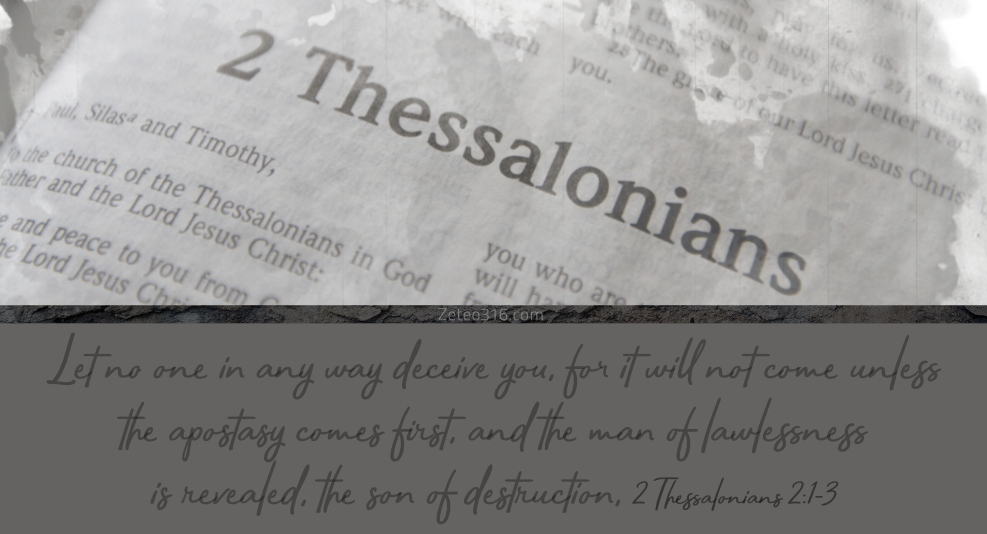
Is second Thessalonians two a pretrib problem? I’ve covered some of this material before, so this is really a recap of sorts.
If you’re on social media a lot and have an interest in prophecy, there’s a chance you may have come across a documentary called “Seven Pretrib Problems and the Prewrath Rapture.” In a previous column, I responded to the so-called “The Early Church Problem.”
This time I’ll take a brief look at “The 2nd Thessalonian Problem.”
An alleged problem
Now we request you, brethren, with regard to the coming of our Lord Jesus Christ, and our gathering together to Him, that you may not be quickly shaken from your composure or be disturbed either by a spirit or a message or a letter as if from us, to the effect that the day of the Lord has come. Let no one in any way deceive you, for it will not come unless the apostasy comes first, and the man of lawlessness is revealed, the son of destruction, 2 Thess 2:1-3
In the documentary, Alan Hultberg states,
If Paul had taught Pretribulationism, his simplest answer would be, ‘No, the rapture hasn’t occurred yet.’ Instead of, ‘No, there are certain things that have to happen first.’ And as soon as you say, ‘There are certain things that have to happen first,’ you’ve undermined Pretribulationism. So, Pretribulationists have a very difficult time, in my opinion, making 2nd Thessalonians to fit with their thinking.
Hultberg assumes that the “it” in verse 3 is the rapture. The reason for this is that his system regards the Rapture and the Day of the Lord as two sides of the same coin (event). Accordingly, when one occurs, the other follows on the same day.
But in verse 3, Paul is specifically referring to the Day of the Lord, not the rapture. They are not the same events. The doc folk interpret the text through a PW posttrib filter.
Tony Garland’s response
I highly recommend reading Tony’s response: What does Paul mean by “that Day”?
He writes,
…confusion is mainly caused by assuming that all references to a future “day” involving Christ must either refer to His return for the Church at the Rapture or His final return in judgment at the Second Coming. However, Scripture reveals a third situation in which Christ is said to “come” which, unfortunately, many erroneously conflate with the Rapture. This “coming” occurs after the Rapture and before the physical Second Coming.
He makes three points in summary:
1) “That Day” refers to the Day of the Lord [not the rapture]; 2) The apostasia could refer to the rapture, or it might be wide-spread spiritual defection from the faith; 3) The Antichrist appears to be revealed at the beginning of the Day of the Lord, and connected to the signing of a covenant with Israel.
Further comments
Of course, more was discussed. It would take further columns to cover it all. Tony Garland touches upon issues re precursors to the Day of the Lord (not the rapture). He also refers to Robert L. Thomas’ important work on imminence and precursors. Note carefully what Thomas actually states regarding apodosis and protasis etc. It can be confusing, but I’ve seen his statements misrepresented.
We can’t avoid bringing some kind of expectation when interpreting Thessalonians. Hence, we ought to remain humble and avoid dogmatism. This documentary criticism of pretrib assumes more than it proves.
For example, Charles Cooper asserts that 2 Thess 2 poses such a problem for pretrib that it has to interpret the apostasia as the rapture. It appears to me that these people are overly perturbed by the apostasy=rapture position. Pretrib doesn’t fly or fall on it.
BTW, some PW proponents assert that the concept of the apostasia being a physical departure (rapture) makes no sense. They try to frame it like this: “for the rapture will not come unless the rapture comes first.” Of course, that doesn’t make sense. Again, they impose their (same event) assumptions.
But what problem is Cooper referring to? He’s aware that pretrib does not conflate the Day of the Lord with the rapture (see his comments re David Guzik). In Fact, PW simply asserts that its (two-sides-of-the-same-coin) position is correct and pretrib is wrong. Therefore, to their way of thinking, the rapture must have precursors.
That’s pretty much it.
Yet the Day of the Lord is connected to God’s wrath and intervention in world affairs. Scripture does not require that the rapture be attached to it.
Maranatha!
More reading
Second Thessalonians One a Pretrib Problem?
Ice: The Pre-Conflagration Rapture
How is the Great Tribulation shortened?
